人教版高中英语必修2甲壳虫乐队
- 格式:doc
- 大小:18.35 KB
- 文档页数:1
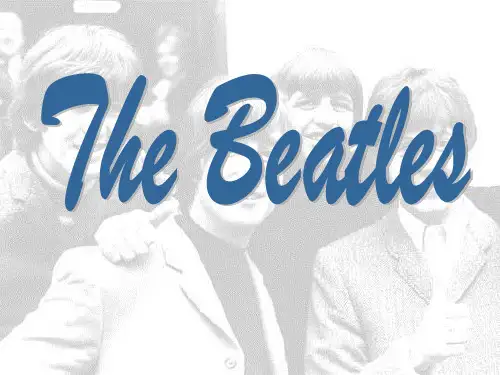
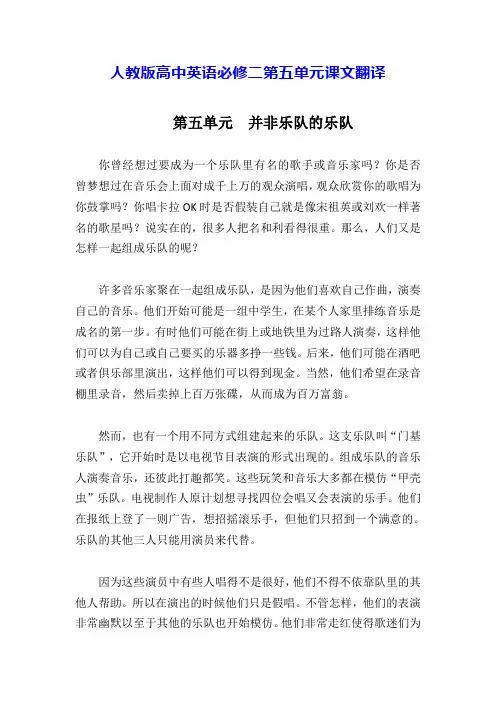
人教版高中英语必修二第五单元课文翻译第五单元并非乐队的乐队你曾经想过要成为一个乐队里有名的歌手或音乐家吗?你是否曾梦想过在音乐会上面对成千上万的观众演唱,观众欣赏你的歌唱为你鼓掌吗?你唱卡拉OK时是否假装自己就是像宋祖英或刘欢一样著名的歌星吗?说实在的,很多人把名和利看得很重。
那么,人们又是怎样一起组成乐队的呢?许多音乐家聚在一起组成乐队,是因为他们喜欢自己作曲,演奏自己的音乐。
他们开始可能是一组中学生,在某个人家里排练音乐是成名的第一步。
有时他们可能在街上或地铁里为过路人演奏,这样他们可以为自己或自己要买的乐器多挣一些钱。
后来,他们可能在酒吧或者俱乐部里演出,这样他们可以得到现金。
当然,他们希望在录音棚里录音,然后卖掉上百万张碟,从而成为百万富翁。
然而,也有一个用不同方式组建起来的乐队。
这支乐队叫“门基乐队”,它开始时是以电视节目表演的形式出现的。
组成乐队的音乐人演奏音乐,还彼此打趣都笑。
这些玩笑和音乐大多都在模仿“甲壳虫”乐队。
电视制作人原计划想寻找四位会唱又会表演的乐手。
他们在报纸上登了一则广告,想招摇滚乐手,但他们只招到一个满意的。
乐队的其他三人只能用演员来代替。
因为这些演员中有些人唱得不是很好,他们不得不依靠队里的其他人帮助。
所以在演出的时候他们只是假唱。
不管怎样,他们的表演非常幽默以至于其他的乐队也开始模仿。
他们非常走红使得歌迷们为了更加熟悉他们而成立了俱乐部。
门基乐队每个星期都要在电视上演唱由别的音乐家创作的歌曲。
然而,经过大约一年以后,门基乐队逐渐对自己的工作认真起来,他们开始像一支真正的乐队那样演唱自己创作的歌曲。
然后他们录制自己的唱片,并且开始巡回表演他们自己的音乐。
在美国,他们甚至比“甲壳虫”乐队还要受欢迎,出售的录音专辑还要多。
“门基乐队”大约在1970年左右解散,但是令人高兴的是,到80年代中期他们再次聚首。
在1996年,他们推出了一张新的专辑,像真正的乐队一样以此来庆祝他们以往的时光。
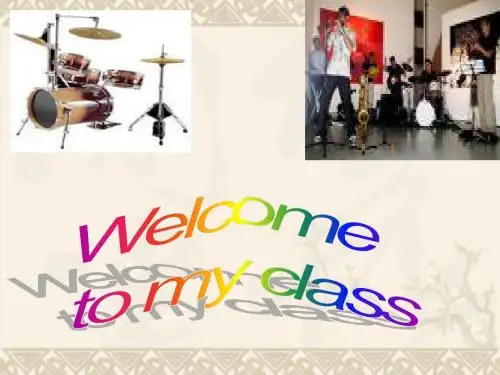
![人教新课标必修二 Unit 5 Music-Warming up and Reading[课件]](https://uimg.taocdn.com/ee5120765acfa1c7aa00cc2c.webp)
![人教版高中英语必修二Unit5Music[单元课件]](https://uimg.taocdn.com/20491289fd0a79563c1e72b8.webp)
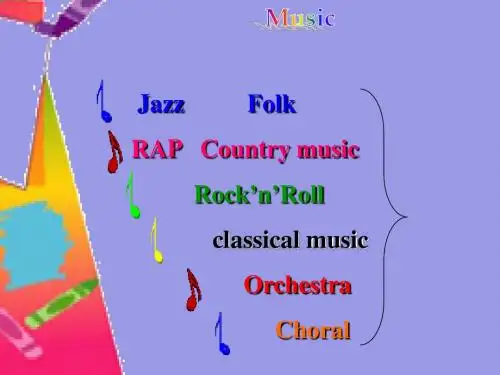
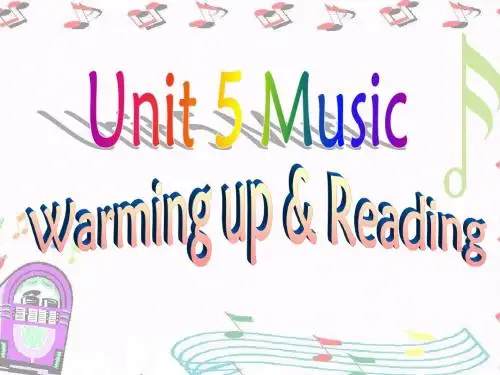
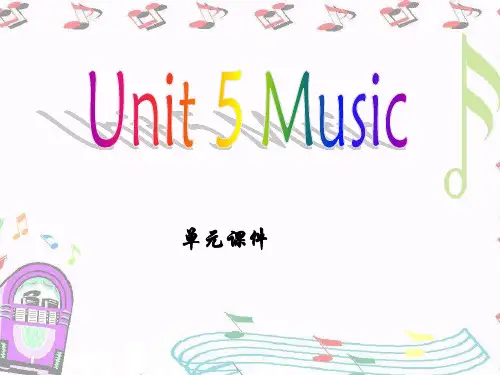
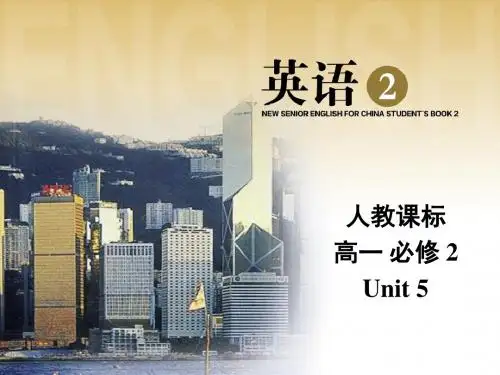
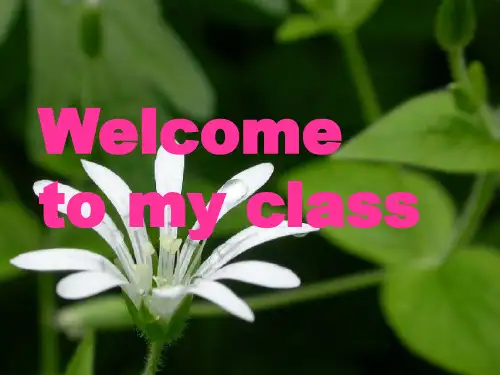
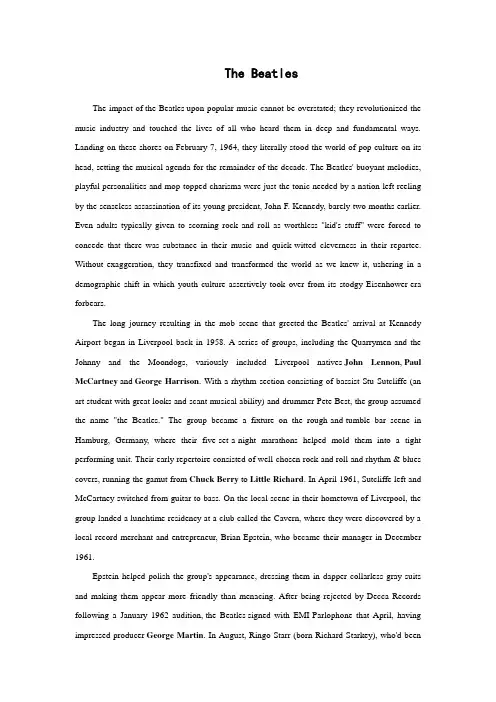
The BeatlesThe impact of the Beatles upon popular music cannot be overstated; they revolutionized the music industry and touched the lives of all who heard them in deep and fundamental ways. Landing on these shores on February 7, 1964, they literally stood the world of pop culture on its head, setting the musical agenda for the remainder of the decade. The Beatles' buoyant melodies, playful personalities and mop-topped charisma were just the tonic needed by a nation left reeling by the senseless assassination of its young president, John F. Kennedy, barely two months earlier. Even adults typically given to scorning rock and roll as worthless "kid's stuff" were forced to concede that there was substance in their music and quick-witted cleverness in their repartee. Without exaggeration, they transfixed and transformed the world as we knew it, ushering in a demographic shift in which youth culture assertively took over from its stodgy Eisenhower-era forbears.The long journey resulting in the mob scene that greeted the Beatles' arrival at Kennedy Airport began in Liverpool back in 1958. A series of groups, including the Quarrymen and the Johnny and the Moondogs, variously included Liverpool natives John Lennon, Paul McCartney and George Harrison. With a rhythm section consisting of bassist Stu Sutcliffe (an art student with great looks and scant musical ability) and drummer Pete Best, the group assumed the name "the Beatles." The group became a fixture on the rough-and-tumble bar scene in Hamburg, Germany, where their five-set-a-night marathons helped mold them into a tight performing unit. Their early repertoire consisted of well-chosen rock and roll and rhythm & blues covers, running the gamut from Chuck Berry to Little Richard. In April 1961, Sutcliffe left and McCartney switched from guitar to bass. On the local scene in their hometown of Liverpool, the group landed a lunchtime residency at a club called the Cavern, where they were discovered by a local record merchant and entrepreneur, Brian Epstein, who became their manager in December 1961.Epstein helped polish the group's appearance, dressing them in dapper collarless gray suits and making them appear more friendly than menacing. After being rejected by Decca Records following a January 1962 audition, the Beatles signed with EMI-Parlophone that April, having impressed producer George Martin. In August, Ringo Starr (born Richard Starkey), who'd beendrumming with Rory Storm and the Hurricanes, was brought into replace Pete Best. The group's first single, "Love Me Do/P.S. I Love You," briefly dented the U.K. Top Twenty in October 1962, but their next 45, "Please Please Me," formally ignited Beatlemania in their homeland, reaching the Number Two spot. It was followed by four consecutive chart-topping British singles, issued throughout 1963: "From Me to You," "She Loves You," "I Want to Hold Your Hand," "Can't Buy Me Love." They conquered the U.K., even inducing a classical music critic from the London Sunday Times to declare them "the greatest composers since Beethoven." The group's success was based around the Lennon/McCartney songwriting partnership, Harrison's guitar-playing prowess, and Starr's amiable disposition and artful simplicity as a drummer.The Beatles' conquest of America early in 1964 launched the British Invasion, as a torrent of rock and roll bands from Britain overtook the pop charts. The Fab Four's first Number One single in the U.S. was "I Want to Hold Your Hand," released on Capitol Records, EMI's American counterpart. This exuberant track was followed by 45 more Top Forty hits over the next half-dozen years. During the week of April 4, 1964, the Beatles set a record that is likely never to be broken when they occupied all five of the top positions on Billboard's Top Pop Singles chart, with "Can't Buy Me Love" ensconced at Number One. Their popularity soared still further with the release of their playfully anarchic documentary film, A Hard Day's Night, in August 1964.When all was said and done, the Beatles charted 20 Number One singles in the States - a number even greater than runner-up Elvis Presley's 17 chart-toppers. For such feats of sales and airplay alone, the Beatles can unassailably be regarded as the top group in rock and roll history. Yet their significance as a band extends beyond numbers to encompass their innovations in the recording studio. The Beatles' legacy as a concert attraction, during their harried passage from nightclubs to baseball stadiums, is distinguished primarily by the deafening screams of female fans overcome by the group's very appearance. Consequently, the Beatles began to indulge their creative energies in the studio, layering sounds and crafting songs in a way no one had attempted before. The results included such musically expansive and lyrically sophisticated albums as Rubber Soul (1965) and Revolver (1966). For various reasons, ranging from safety concerns to frustration that no one could hear or was listening, the Beatles retired from touring after a San Francisco concert on August 29, 1966.Ten months later, they released Sgt. Pepper's Lonely Hearts Club Band, an album that has almost universally been cited as the creative apotheosis of rock and roll, a watershed event in which rock became "serious art" without losing its sense of humor (or sense of the absurd). Realizing the band members' collective ambitions took four months and all the technical wiles of producer George Martin. A completely self-contained album meant to be played and experienced from start to finish, Sgt. Pepper broke the mold in that no singles were released from it. The album's heady artistic reach further cemented the notion of a viable counterculture in the minds of youthful dropouts everywhere. Anyone who was alive in the summer of 1967 can remember the pleasant shock of hearing it and the reverberations it sent outward into the world of rock and roll and beyond.In the wake of Sgt. Pepper, the Beatles began to splinter in ways that were, at first, subtle but that gradually grew more pronounced. Subsequent events included the death of manager Epstein due to an overdose of sleeping pills; the release of the TV film Magical Mystery Tour, which earned the Beatles some of their first negative reviews; a trip to India to meditate with Maharishi Mahesh Yogi, about whom Lennon wrote the scabrous putdown "Sexy Sadie"; and the launching in January 1968 of Apple Corps, Ltd., a disastrously mismanaged entertainment empire that helped bring down the Beatles amid a tangled maze of money matters.Through all the chaotic events of the late Sixties, the Beatles managed to retain their integrity and focus as recording artists. Released in August 1968, the single "Hey Jude"/"Revolution" became their most popular single. The Beatles (1968), a double-LP popularly referred to as "the White Album," was like a prism that found the group refracting into four individual and highly estimable talents. The album and film Let It Be, recorded in 1969 but shelved until 1970, essentially documented the Beatles' dissolution and breakup amid internal squabbles and the presence of John Lennon's new mate, Yoko Ono. Yet the Beatles came together and exited on a high note, uniting in the summer of 1969 to record their swan song, Abbey Road.On April 10, 1970, Paul McCartney announced his departure from the Beatles, and the group quietly came to an end. Throughout the Seventies, fans hoped for an eventual reunion, while the group members pursued solo careers with varying degrees of artistic and commercial success. Those hopes were forever dashed by the murder of John Lennon in New York City on December 8, 1980.July 7, 1940Ringo Starr was born.October 9, 1940John Lennon is born at Oxford Street Maternity Hospital in Liverpool, England, to Julia Stanley and Alfred Lennon.June 18, 1942James Paul McCartney is born in Liverpool, England.February 25, 1943George Harrison was born.1956Julia, John Lennon's mother, bought him his first guitar through a mail order ad. His incessant playing prompts John's Aunt Mimi to say, "The guitar's all very well as a hobby, John, but you'll never make a living out of it." John forms his first group, the Quarrymen.July 6, 1957John Lennon meets Paul McCartney at the Woolton Parish Church in Liverpool during a performance by John's group the Quarrymen. Impressed by Paul's ability to tune a guitar and by his knowledge of song lyrics, John asks him to join the group.February 1, 1958Paul McCartney introduces George Harrison to the Quarrymen at a basement teen club called the Morgue. George joins the group.August 1, 1960The Beatles make their debut in Hamburg, West Germany, with Stu Sutcliffe on bass and Pete Best on drums.January 1, 1961The Beatles make their debut at the Cavern Club in Liverpool.November 1, 1961Local record store manager Brian Epstein is introduced to the Beatles. He soon signs a contract to manage them.The Beatles make their radio debut performing three songs, including Roy Orbison's "Dream Baby," on the BBC.April 10, 1962Stu Sutcliffe dies of a brain hemorrhage.June 1, 1962The Beatles audition for George Martin at Parlophone/EMI Records. He agrees to sign the group, but insists that Pete Best be replaced. Within months, Richard "Ringo" Starkey joins the group. SEPTEMBER 4-11, 1962The Beatles record their first sessions at EMI Studios in London, with George Martin as producer.December 1, 1963"I Want to Hold Your Hand,"the Beatles' first American single, is released by Capitol Records. January 26, 1964I Want To Hold Your Hand (The Beatles) was a hit.February 7, 1964The Beatles arrive in AmericaFebruary 9, 1964The Beatles make their first appearance on 'The Ed Sullivan Show'.February 11, 1964The Beatles begin their first U.S. tour at the Coliseum in Washington, D.C.March 15, 1964She Loves You (The Beatles) was a hit.March 29, 1964Can't Buy Me Love (The Beatles) was a hit.April 4, 1964The top five slots on the 'Billboard' chart are held by the Beatles, a feat never before or since matched.May 24, 1964Love Me Do (The Beatles) was a hit.The world premiere of The Beatles' 'A Hard Day's Night' takes place in London.July 26, 1964A Hard Day's Night (The Beatles) was a hit.August 14, 1964The Beatles cut Little Willie John's "Leave My Kitten Alone" at EMI Studios in London. Intended for album 'Beatles For Sale' ('Beatles '65' in the US), it was left off and remained unreleased until 'Anthology 1' in 1995.1964The Beatles release "This Boy" from their first American album 'Meet the Beatles'.December 20, 1964I Feel Fine (The Beatles) was a hit.March 7, 1965Eight Days a Week (The Beatles) was a hit.1965The Beatles release "Yes It Is".April 1, 1965John Lennon composes "Help!" the title song for the Beatles' second film. He later confides that the lyrics are a cry for help and a clue to the confusion and despondency he feels.May 16, 1965Ticket to Ride (The Beatles) was a hit.July 29, 1965The Beatles release their second film, 'Help!'.August 15, 1965The Beatles play in front of almost 60,000 fans at Shea Stadium in New York City. August 27, 1965The Beatles spend the evening talking and playing music with Elvis Presley at his Bel air home. August 29, 1965Help! (The Beatles) was a hit.October 3, 1965Yesterday (The Beatles) was a hit.October 9, 1965The Beatles reach #1 with "Yesterday".October 26, 1965The Beatles are awarded England's prestigious MBE (Members of the Order of the British Empire). John comments, "I thought you had to drive tanks and win wars to get the MBE." January 2, 1966We Can Work It Out (The Beatles) was a hit.March 1, 1966London's 'Evening Standard' publishes an interview with John Lennon in which he states that the Beatles are "more popular than Jesus now." The comment provokes several protests, including the burning of Beatles records.June 19, 1966Paperback Writer (The Beatles) was a hit.July 31, 1966John Lennon's comments on the state of Christianity ?made in March, but only lately picked up in the U.S. - spark protests and record burnings on the eve of the Beatles' 1966 American tour. August 29, 1966After their concert at San Francisco's Candlestick Park, the Beatles declare this to be their final concert tour.SEPTEMBER/OCTOBER 1966John Lennon makes his first appearance away from the Beatles in the role of Private Gripweed in Richard Lester's film 'How I Won the War'. He writes "Strawberry Fields Forever" during the filming.March 12, 1967Penny Lane (The Beatles) was a hit.March 18, 1967The Beatles reach #1 with "Penny Lane".June 1, 1967'Sgt. Pepper's Lonely Hearts Club Band' is released in Britain.August 1, 1967Beatle George Harrison and his wife, Patti, stroll through the streets of Haight-Ashbury, bringing more international attention to the scene.August 13, 1967All You Need Is Love (The Beatles) was a hit.August 19, 1967The Beatles reach #1 with "All You Need Is Love".September 1, 1967John Lennon writes "I Am the Walrus" while under the influence of LSD. He also anonymously sponsors Yoko Ono's Half a Wind Show (subtitled Yoko Plus Me) at London's Lisson Gallery. December 24, 1967Hello Goodbye (The Beatles) was a hit.December 30, 1967The Beatles reach #1 with "Hello Goodbye".February 15, 1968The Beatles depart for Rishikesh, India, for an advanced course in transcendental meditation. May 1, 1968Apple Corps, Ltd. begins operating in London. It is the Beatles' attempt to take control of their own creative and economic destiny. Later that month, John invites Yoko to his house in Weybridge. They make experimental tapes all night.September 22, 1968Hey Jude (The Beatles) was a hit.September 28, 1968The Beatles reach #1 with "Hey Jude".January 30, 1969The Beatles make their last performance as a group on the roof of the Apple building during the filming of 'Let It Be'.May 18, 1969Get Back (The Beatles) was a hit.May 24, 1969The Beatles reach #1 with "Get Back".November 23, 1969Come Together (The Beatles) was a hit.November 29, 1969The Beatles reach #1 with "Come Together".April 5, 1970Let It Be (The Beatles) was a hit.April 10, 1970Paul McCartney announces that he is leaving the Beatles due to "personal, business and musical differences."June 7, 1970The Long and Winding Road (The Beatles) was a hit.January 2, 1975John and Yoko are reunited. The Beatles' final dissolution takes place in London.December 8, 1980John Lennon is shot by a deranged assailant as he and Yoko return to the Dakota after a recording session. He is pronounced dead at Roosevelt Hospital.1988The Beatles inducted into the Rock and Roll Hall of Fame.November 19, 1995"Free as a Bird," the first new Beatles single in 25 years, is premiered on the televised Beatles Anthology. The song, a 1977 demo by John Lennon completed in 1995 by the three surviving Beatles, reaches #6 on the singles chart in early 1996.March 23, 1996"Real Love," a 1979 John Lennon demo finished in 1995 by the other Beatles, becomes the second new Beatles single to chart in less than three months. Released as part of 'The Beatles Anthology' recordings and TV special, it reaches #11 ?not bad for a band that broke up in 1970. November 29, 2001George Harrison dies at the age of 58 after a long battle with cancer.。
The BeatlesThe impact of the Beatles upon popular music cannot be overstated; they revolutionized the music industry and touched the lives of all who heard them in deep and fundamental ways. Landing on these shores on February 7, 1964, they literally stood the world of pop culture on its head, setting the musical agenda for the remainder of the decade. The Beatles' buoyant melodies, playful personalities and mop-topped charisma were just the tonic needed by a nation left reeling by the senseless assassination of its young president, John F. Kennedy, barely two months earlier. Even adults typically given to scorning rock and roll as worthless "kid's stuff" were forced to concede that there was substance in their music and quick-witted cleverness in their repartee. Without exaggeration, they transfixed and transformed the world as we knew it, ushering in a demographic shift in which youth culture assertively took over from its stodgy Eisenhower-era forbears.The long journey resulting in the mob scene that greeted the Beatles' arrival at Kennedy Airport began in Liverpool back in 1958. A series of groups, including the Quarrymen and the Johnny and the Moondogs, variously included Liverpool natives John Lennon, Paul McCartney and George Harrison. With a rhythm section consisting of bassist Stu Sutcliffe (an art student with great looks and scant musical ability) and drummer Pete Best, the group assumed the name "the Beatles." The group became a fixture on the rough-and-tumble bar scene in Hamburg, Germany, where their five-set-a-night marathons helped mold them into a tight performing unit. Their early repertoire consisted of well-chosen rock and roll and rhythm & blues covers, running the gamut from Chuck Berry to Little Richard. In April 1961,Sutcliffe left and McCartney switched from guitar to bass. On the local scene in their hometown of Liverpool, the group landed a lunchtime residency at a club called the Cavern, where they were discovered by a local record merchant and entrepreneur, Brian Epstein, who became their manager in December 1961.Epstein helped polish the group's appearance, dressing them in dapper collarless gray suits and making them appear more friendly than menacing. After being rejected by Decca Records following a January 1962 audition, the Beatles signed with EMI-Parlophone that April, having impressed producer George Martin. In August, Ringo Starr (born Richard Starkey), who'd been drumming with Rory Storm and the Hurricanes, was brought into replace Pete Best. The group's first single, "Love Me Do/P.S. I Love You," briefly dented the U.K. Top Twenty in October 1962, but their next 45, "Please Please Me," formally ignited Beatlemania in their homeland, reaching the Number Two spot. It was followed by four consecutive chart-topping British singles, issued throughout 1963: "From Me to You," "She Loves You," "I Want to Hold Your Hand," "Can't Buy Me Love." They conquered the U.K., even inducing a classical music critic from the London Sunday Times to declare them "the greatest composers since Beethoven." The group's success was based around the Lennon/McCartney songwriting partnership, Harrison's guitar-playing prowess, and Starr's amiable disposition and artful simplicity as a drummer.The Beatles' conquest of America early in 1964 launched the British Invasion, as a torrent of rock and roll bands from Britain overtook the pop charts. The Fab Four's first Number One single in the U.S. was "I Want to Hold Your Hand," released on Capitol Records, EMI's American counterpart.This exuberant track was followed by 45 more Top Forty hits over the next half-dozen years. During the week of April 4, 1964, the Beatles set a record that is likely never to be broken when they occupied all five of the top positions on Billboard's Top Pop Singles chart, with "Can't Buy Me Love" ensconced at Number One. Their popularity soared still further with the release of their playfully anarchic documentary film, A Hard Day's Night, in August 1964.When all was said and done, the Beatles charted 20 Number One singles in the States - a number even greater than runner-up Elvis Presley's 17 chart-toppers. For such feats of sales and airplay alone, the Beatles can unassailably be regarded as the top group in rock and roll history. Yet their significance as a band extends beyond numbers to encompass their innovations in the recording studio. The Beatles' legacy as a concert attraction, during their harried passage from nightclubs to baseball stadiums, is distinguished primarily by the deafening screams of female fans overcome by the group's very appearance. Consequently, the Beatles began to indulge their creative energies in the studio, layering sounds and crafting songs in a way no one had attempted before. The results included such musically expansive and lyrically sophisticated albums as Rubber Soul (1965) and Revolver (1966). For various reasons, ranging from safety concerns to frustration that no one could hear or was listening, the Beatles retired from touring after a San Francisco concert on August 29, 1966.Ten months later, they released Sgt. Pepper's Lonely Hearts Club Band, an album that has almost universally been cited as the creative apotheosis of rock and roll, a watershed event in which rock became "serious art" without losing its sense of humor (or sense of the absurd). Realizing the bandmembers' collective ambitions took four months and all the technical wiles of producer George Martin. A completely self-contained album meant to be played and experienced from start to finish, Sgt. Pepper broke the mold in that no singles were released from it. The album's heady artistic reach further cemented the notion of a viable counterculture in the minds of youthful dropouts everywhere. Anyone who was alive in the summer of 1967 can remember the pleasant shock of hearing it and the reverberations it sent outward into the world of rock and roll and beyond.In the wake of Sgt. Pepper, the Beatles began to splinter in ways that were, at first, subtle but that gradually grew more pronounced. Subsequent events included the death of manager Epstein due to an overdose of sleeping pills; the release of the TV film Magical Mystery Tour, which earned the Beatles some of their first negative reviews; a trip to India to meditate with Maharishi Mahesh Yogi, about whom Lennon wrote the scabrous putdown "Sexy Sadie"; and the launching in January 1968 of Apple Corps, Ltd., a disastrously mismanaged entertainment empire that helped bring down the Beatles amid a tangled maze of money matters.Through all the chaotic events of the late Sixties, the Beatles managed to retain their integrity and focus as recording artists. Released in August 1968, the single "Hey Jude"/"Revolution" became their most popular single. The Beatles (1968), a double-LP popularly referred to as "the White Album," was like a prism that found the group refracting into four individual and highly estimable talents. The album and film Let It Be, recorded in 1969 but shelved until 1970, essentially documented the Beatles' dissolution and breakup amid internal squabbles and the presence of John Lennon's new mate, Yoko Ono. Yet the Beatles came together andexited on a high note, uniting in the summer of 1969 to record their swan song, Abbey Road.On April 10, 1970, Paul McCartney announced his departure from the Beatles, and the group quietly came to an end. Throughout the Seventies, fans hoped for an eventual reunion, while the group members pursued solo careers with varying degrees of artistic and commercial success. Those hopes were forever dashed by the murder of John Lennon in New York City on December 8, 1980.July 7, 1940Ringo Starr was born.October 9, 1940John Lennon is born at Oxford Street Maternity Hospital in Liverpool, England, to Julia Stanley and Alfred Lennon.June 18, 1942James Paul McCartney is born in Liverpool, England.February 25, 1943George Harrison was born.1956Julia, John Lennon's mother, bought him his first guitar through a mail order ad. His incessant playing prompts John's Aunt Mimi to say, "The guitar's all very well as a hobby, John, but you'll never make a living out of it." John forms his first group, the Quarrymen.July 6, 1957John Lennon meets Paul McCartney at the Woolton Parish Church in Liverpool during a performance by John's group the Quarrymen. Impressed by Paul's ability to tune a guitar and by his knowledge of song lyrics, John asks him to join the group.February 1, 1958Paul McCartney introduces George Harrison to the Quarrymen at a basement teen club called the Morgue. George joins the group.August 1, 1960The Beatles make their debut in Hamburg, West Germany, with Stu Sutcliffe on bass and Pete Best on drums.January 1, 1961The Beatles make their debut at the Cavern Club in Liverpool.November 1, 1961Local record store manager Brian Epstein is introduced to the Beatles. He soon signs a contract to manage them.March 7, 1962The Beatles make their radio debut performing three songs, including Roy Orbison's "Dream Baby," on the BBC.April 10, 1962Stu Sutcliffe dies of a brain hemorrhage.June 1, 1962The Beatles audition for George Martin at Parlophone/EMI Records. He agrees to sign the group, but insists that Pete Best be replaced. Within months, Richard "Ringo" Starkey joins the group.SEPTEMBER 4-11, 1962The Beatles record their first sessions at EMI Studios in London, with George Martin as producer.December 1, 1963"I Want to Hold Your Hand," the Beatles' first American single, is released by Capitol Records.January 26, 1964I Want To Hold Your Hand (The Beatles) was a hit.February 7, 1964The Beatles arrive in AmericaFebruary 9, 1964The Beatles make their first appearance on 'The Ed Sullivan Show'. February 11, 1964The Beatles begin their first U.S. tour at the Coliseum in Washington, D.C. March 15, 1964She Loves You (The Beatles) was a hit.March 29, 1964Can't Buy Me Love (The Beatles) was a hit.April 4, 1964The top five slots on the 'Billboard' chart are held by the Beatles, a feat never before or since matched.May 24, 1964Love Me Do (The Beatles) was a hit.July 6, 1964The world premiere of The Beatles' 'A Hard Day's Night' takes place in London. July 26, 1964A Hard Day's Night (The Beatles) was a hit.August 14, 1964The Beatles cut Little Willie John's "Leave My Kitten Alone" at EMI Studios in London. Intended for album 'Beatles For Sale' ('Beatles '65' in the US), it was left off and remained unreleased until 'Anthology 1' in 1995. 1964The Beatles release "This Boy" from their first American album 'Meet the Beatles'.December 20, 1964I Feel Fine (The Beatles) was a hit.March 7, 1965Eight Days a Week (The Beatles) was a hit.1965The Beatles release "Yes It Is".April 1, 1965John Lennon composes "Help!" the title song for the Beatles' second film. He later confides that the lyrics are a cry for help and a clue to the confusion and despondency he feels.May 16, 1965Ticket to Ride (The Beatles) was a hit.July 29, 1965The Beatles release their second film, 'Help!'.August 15, 1965The Beatles play in front of almost 60,000 fans at Shea Stadium in New York City. August 27, 1965The Beatles spend the evening talking and playing music with Elvis Presley at his Bel air home.August 29, 1965Help! (The Beatles) was a hit.October 3, 1965Yesterday (The Beatles) was a hit.October 9, 1965The Beatles reach #1 with "Yesterday".October 26, 1965The Beatles are awarded England's prestigious MBE (Members of the Order of the British Empire). John comments, "I thought you had to drive tanks and win wars to get the MBE."January 2, 1966We Can Work It Out (The Beatles) was a hit.March 1, 1966London's 'Evening Standard' publishes an interview with John Lennon in which he states that the Beatles are "more popular than Jesus now." The comment provokes several protests, including the burning of Beatles records. June 19, 1966Paperback Writer (The Beatles) was a hit.July 31, 1966John Lennon's comments on the state of Christianity ?made in March, but only lately picked up in the U.S. - spark protests and record burnings on the eve of the Beatles' 1966 American tour.August 29, 1966After their concert at San Francisco's Candlestick Park, the Beatles declare this to be their final concert tour.SEPTEMBER/OCTOBER 1966John Lennon makes his first appearance away from the Beatles in the role of Private Gripweed in Richard Lester's film 'How I Won the War'. He writes "Strawberry Fields Forever" during the filming.March 12, 1967Penny Lane (The Beatles) was a hit.March 18, 1967The Beatles reach #1 with "Penny Lane".June 1, 1967'Sgt. Pepper's Lonely Hearts Club Band' is released in Britain.August 1, 1967Beatle George Harrison and his wife, Patti, stroll through the streets of Haight-Ashbury, bringing more international attention to the scene. August 13, 1967All You Need Is Love (The Beatles) was a hit.August 19, 1967The Beatles reach #1 with "All You Need Is Love".September 1, 1967John Lennon writes "I Am the Walrus" while under the influence of LSD. He also anonymously sponsors Yoko Ono's Half a Wind Show (subtitled Yoko Plus Me) at London's Lisson Gallery.December 24, 1967Hello Goodbye (The Beatles) was a hit.December 30, 1967The Beatles reach #1 with "Hello Goodbye".February 15, 1968The Beatles depart for Rishikesh, India, for an advanced course in transcendental meditation.May 1, 1968Apple Corps, Ltd. begins operating in London. It is the Beatles' attempt to take control of their own creative and economic destiny. Later that month, John invites Yoko to his house in Weybridge. They make experimental tapes all night.September 22, 1968Hey Jude (The Beatles) was a hit.September 28, 1968The Beatles reach #1 with "Hey Jude".January 30, 1969The Beatles make their last performance as a group on the roof of the Apple building during the filming of 'Let It Be'.May 18, 1969Get Back (The Beatles) was a hit.May 24, 1969The Beatles reach #1 with "Get Back".November 23, 1969Come Together (The Beatles) was a hit.November 29, 1969The Beatles reach #1 with "Come Together".April 5, 1970Let It Be (The Beatles) was a hit.April 10, 1970Paul McCartney announces that he is leaving the Beatles due to "personal, business and musical differences."June 7, 1970The Long and Winding Road (The Beatles) was a hit.January 2, 1975John and Yoko are reunited. The Beatles' final dissolution takes place in London.December 8, 1980John Lennon is shot by a deranged assailant as he and Yoko return to the Dakota after a recording session. He is pronounced dead at Roosevelt Hospital.1988The Beatles inducted into the Rock and Roll Hall of Fame.November 19, 1995"Free as a Bird," the first new Beatles single in 25 years, is premiered on the televised Beatles Anthology. The song, a 1977 demo by John Lennon completed in 1995 by the three surviving Beatles, reaches #6 on the singles chart in early 1996.March 23, 1996"Real Love," a 1979 John Lennon demo finished in 1995 by the other Beatles, becomes the second new Beatles single to chart in less than three months. Released as part of 'The Beatles Anthology' recordings and TV special, it reaches #11 ?not bad for a band that broke up in 1970.November 29, 2001George Harrison dies at the age of 58 after a long battle with cancer.。
人教版必修二Unit5_music_ReadingUnit5 MusicReadingCan we call them (Metro) 地铁站乐团a band?1. Instrument 乐器2. Write their own songsHave you heard about any of the famous bands in the world? List some if you have.Back Street BoyThe Beatles甲壳虫乐队又称:批头士Do you know the Monkees门基乐队?A big hit!The Band That Wasn’tRead the passage quickly and try to findout:1.How many bands are mentioned in the passage? What are their names?Two. “The Beatles” and ” The Monkees”.2.Which band is “The Band That Wasn’t”?“The Monkees”.1. Skim the passage quickly and choose the main idea of each paragraph.Paragraph Paragraph1 Paragraph2 Main ideaFast readingParagraph3 Paragraph4C AD BA. How most bands start.B. How the Monkees became popular and how they developed as a real band.C. Many people want to be famous as singers or musicians.D. The Monkees started in a different way.2. Join the correct parts of the sentences together. 1.They produced a new record in 1996________ D 2.Most musicians get together and_________ C3.They put an advertisement in the newspaper looking for four rock musicians, _________ A E4. The first TV show___________ B5. However, the band broke up about 1970,____A. but only one person was accepted.B. but reunited in the mid-1980s.C. form a band because they like to write and play music.D. to celebrate their time as a band.E. was a big hit.True or false (T/F)1.The writer believes that lots of people attach great importance to becoming rich and famous . T 2.Some bands in American must may start as a F group of high school students. 3.It was“ The The Beatles" Monkees that started in a different way. F 4.It was hard for the TV organizers to look for T good rock musicians. 5.At first," The Monkees" didn't play their own songs. TPara. 34 Para.34 The development of the Mooknees.in 1996 in the mid-1980s in about 1970 after a year or soa real band ? reunited? broke upbecame seriousmusic jokes beganbased on ? The Beatles a TV show as ?Group Work(小组活动)Requirements:Please firstly finish the task by yourself, and then discuss the answers in your groups. After discussion, each group should present your answers.我的课堂我做主Post readingFinish the short passage according to the text.To be ___________, most of us have honest dreamed of _____________becoming famous and rich sometimes in our lives. Many form musicians often meet and_________a band. Sometimes they play in the street passers-by to_______________so that they can extra earn some_________money or pay for instruments their _________________. There was once a band started in a different way.The musicians of whom the band was played _______ jokes _____each on formed ______ other as well as played music, whose music and on based jokes were _________loosely______ “The Beatles”. They were so popular that their fans formed clubs in order to get familiar ________them. with more_________ Though up broke _______in it ________ 1970, it reunited in the mid-1980s and it is still popular today.Discussion1.How do you understand the title “The Band That Wasn’t”? Can it be changed into “The Band That isn’t”?2.What do you learn from The Monkees’ success?1. 找出文中黑体单词及中文意思,并抄写在作业本上。
甲壳虫乐队
甲壳虫乐队又名“披头士”(Beatles),Beat在英文中是“搏击跳动”的意思。
甲壳虫乐队是1960年由约翰·列侬、保罗·卡麦锡、乔治·哈里森、林里·斯达尔组成,他们四个人中由列农担任演唱和节奏吉它手,麦卡锡担任演唱和低音吉它手,哈里森为主奏吉它手,斯达尔任架子鼓手。
1962年9月乐队发行了第一张唱片,1964年第一季度,乐队的唱片销量高达美国唱片总销量的60%,该年的首次访美成为美国最轰动的事件。
甲壳虫乐队以其反上流社会,反正统艺术的风格,锋利而快捷敢于接触社会敏感问题的内容,在舞台上那种与世俗挑战的举止,征服了各国青年。
不少歌曲表现了一代青年对社会失望、低落和愤懑的心情。